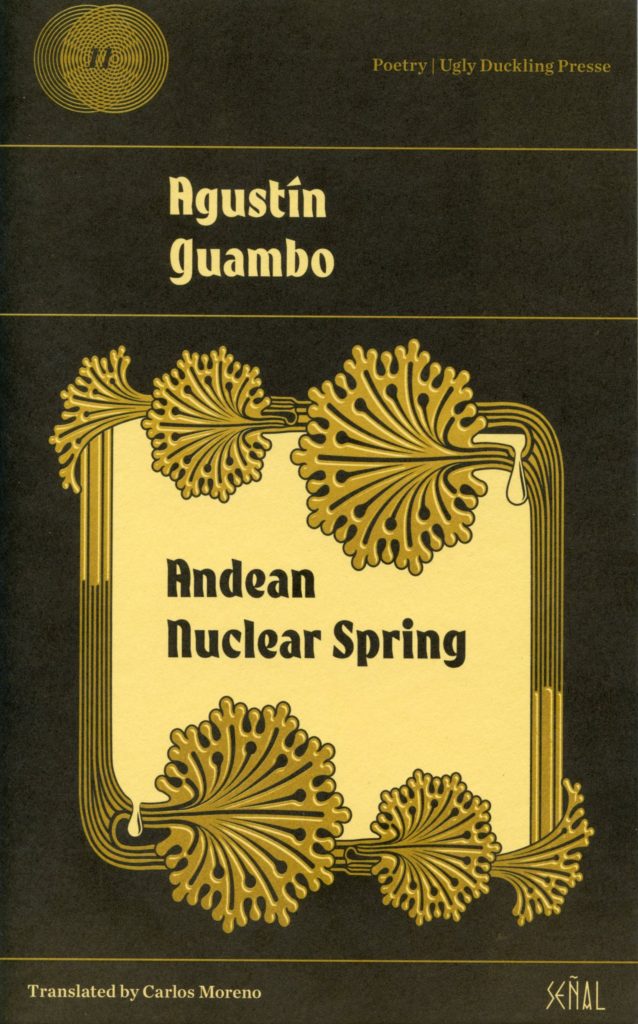Guambo brings us a discourse unsubmissive and fighting
Yuliana Ortiz Ruano

Andean Nuclear Spring
Agustín Guambo
Translated by Carlos Moreno
December 2019
Agustín Guambo’s Andean Nuclear Spring is a literary artifice that situates us in the heart of the post-apocalypse in Quito. In this nuclear spring, Quito could be any other city in Latin America: a reality populated by plain landscapes, dreams, rhinoceri, the changing direction of wind, ashes and chants passed into the future from one generation to the next. Disparate voices speak: from native quechua to punk songs, they carry parts of a story whose narration describes a moment near us but not quite where we are, mapping, where destruction burrowed its way into our societies. This is an attempt toward faith in our ideologies, identities, cultural backgrounds, and the never-ending presence of love. And — or — it is a Latin American (that is, American) neo-baroque aesthetics of the void, that vast unfilled body like a starry night on the páramo.
About the Author
Agustín Guambo (Quito, Ecuador) is a poet, writer, and anthropologist. He directs the anarcho-editorial Project Murcielagario Kartonera, and organized the first two years of the International poetry festival Lectura de un Kanibal Urbano (Lecture of an Urban Kanibal) in Quito. His publications include POPEYE’s Sea (La Apacheta Cartonera); Ceniza de Rinoceronte (La Caída); and Primavera Nuclear Andina (A/terna). His work has been included in the anthologies Sangre de Spondylus: Ecuadorian Late Poetry (Vallejo & Co., Peru) selected by Luis Carlos Musso and Mario Pera; and País imaginario: Escrituras y transtextos: Poesía Latinoamericana 1980 – 1992, selected by Maurizio Medo, Mario Arteca, and Reynaldo Jiménez (Ay del seis). Guambo has participated in multiple lectures and readings in Latin America including the Buenos Aires Book Fair, Lima’s Anti FIL, Cali, La Paz, and Santiago, and won the Ruben Bonifacio Nuño Prize in Mexico.
Praise
In his poetry, Guambo brings us a discourse unsubmissive and fighting, not a voice we’re used to hearing from a comfort zone. This author speaks from his ingenuity, his mestizaje, and his ancestors, but he also speaks for those living and fighting in the present time and in the city, here and now.
Yuliana Ortiz Ruano
Guambo has done what every poet hopes for sometimes for all of his life: take with both hands—like a living, scaled animal—the certainty that poetry is elusive and that the poem is nothing else but an exceptional gleam in darkness.
Huilo Ruales Hualca
The nightmarish tone of Guambo's writing, the subjective sense of swirling disorientation in a world that has normalized madness, echoes some of the most hallucinatory passages in Leslie Marmon Silko's 1977 novel Ceremony and, closer to Guambo's own experiences, the long visionary poems of the Panamanian poet Roberto Harrison. For Guambo and Harrison, neo-surrealism is less an aesthetic "experiment" than a necessary deformation of colonial languages (Spanish and English) in order to recover indigenous insights into the significance of historical experience within mythic time.
Tyrone Williams, Full Stop
About the Translator
Carlos Moreno (Carlos No) (Quito, Equador) is a visual artist, researcher in the field of cultural politics, and independent cultural agent. His work focuses on the relationship of the public with the arts. He curates and produces diverse exhibitions and collective projects to address the problematics of cultural sustainability in Quito as well as the debate on the influence of Western culture in the periphery. He is part of the collectives Komuna Kitu and Cultura Viva Comunitaria. He has edited TrueQue’s Residency compilation (Ayampe, Ecuador) and written articles about cultural politics in Latin America, the arts, and education. Moreno is working on a master’s thesis about public funds in culture at Simón Bolívar Andean University and is pursuing a master’s degree in Sociology at the Latin American Social Sciences Institute.
In the News
Publication Details
ISBN: 978-1-946433-36-7
Chapbook
Staple-bound. 40 pp, 5.25 x 8.25 in
Publication Date: December 01 2019
Distribution: SPD
Series: Señal #11